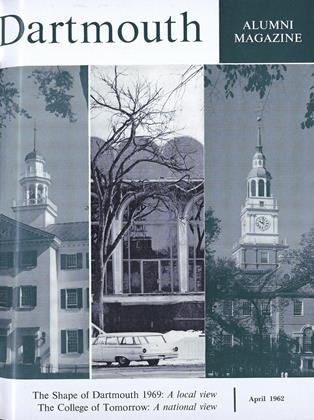THE special insert appearing in this issue and dealing with The College ofTomorrow in national terms has induced us to devote our own contents to a similar but local look at Dartmouth College. Since 1954 the College has been engaged in a conscious, planned effort to lift every aspect of the institution to a still higher level of excellence by the time of the bicentennial year 1969. That fifteen-year program is now slightly past the halfway mark, making this an appropriate time to review the major accomplishments of recent years and, on the basis of those developments and others in the making, to hazard an educated guess about the state of Dartmouth 1969.
A paradox of higher education today is that change is one of its constants. One certainty about Dartmouth is that on top of the changes that have happened and are in the process of happening still more changes are yet to come. And it is alumni understanding of this "fact of life" in the educational world of the 1960's that we want to discuss briefly here.
Dartmouth, in common with all the country's leading institutions of higher learning, is going through a revolutionary period with regard to what is demanded of it and what it is doing to respond affirmatively to the needs of a nation and a world changing at a pace never experienced before. It is important, as President Dickey keeps pointing out, that Dartmouth make this response in terms of its central and enduring purpose as an undergraduate, liberal arts college serving human society. But if it is to remain the first-rate institution that Dartmouth men, foremost of all, want it to be, the College must be concerned not only with tra- dition and ongoing purpose but also with "the competitive realities of the race in which we have chosen to run," as President Dickey says in the following article. These realities embrace the competition for first-rate faculty and first-rate students, the development of significant new programs on other campuses, and the growing requirement of graduate study for desirable jobs in all fields today.
A better understanding of the changing dimensions of higher education is es- sential to the welfare of the College, especially a better understanding on the part of the alumni. This is not likely to be achieved without some conscious effort, because alumni naturally enough are prone to keep on thinking of alma mater in terms of the college of yesteryear. Such terms were never really applicable to any living, advancing institution, and today they can be fantastically out of focus with the reality of what is required of Dartmouth if it is to respond to the demands of the modern world and is to hold its place of leadership and distinction among the country's colleges and universities.
Change is a constant in the life of today's college, and the way the modern world is going, the pace will accelerate rather than slacken. Dartmouth has complex responsibilities to meet and difficult problems to solve. There will be no end of them, up to 1969 and after. Close and wonderful as has been the relationship of Dartmouth men to the College, leading to unequalled interest and support, this too must take on a new dimension. And that new dimension is an awareness of the nature of all higher education today, out of which can come only a truer understanding of Dartmouth 1962, Dartmouth 1969, and Dartmouth on into its third century of service to human society.
THIS ARTICLE is based on an informal statement made by the Presi- dent at the joint meeting of the Trustees and Alumni Council in Hanover on January 26.
President Dickeystates the importance ofa cohesive purposein the life of a collegeand sees this asan enduring strengthat Dartmouthwhatever the new formsof her daily workin education.
 View Full Issue
View Full Issue
More From This Issue
-
 Feature
FeatureTHE SHAPE OF DARTMOUTH 1969
April 1962 By C.E.W -
 Feature
FeatureMost Exciting Place on Campus
April 1962 By JOHN R. SCOTFORD JR. '38, -
 Feature
FeatureWho will pay—and how?
April 1962 -
 Feature
FeatureTPC: MASTER PLANNER
April 1962 -
 Feature
FeatureWhat Role for the Alumni?
April 1962 By SIDNEY C. HAYWARD '26, -
 Feature
FeatureDartmouth's Ongoing Purpose
April 1962
Features
-
 Feature
FeatureCLASS ACHIEVEMENTS 1962 FUND
NOVEMBER 1962 -
 Cover Story
Cover StoryGoing Places
April 1981 -
 Feature
FeatureHopkins Center and Dartmouth Hall
July 1957 By CHURCHILL P. LATHROP -
 Feature
FeatureTwin Pillar of Alumni Support
DECEMBER 1964 By FORD H. WHELDEN '25 -
 Cover Story
Cover StoryTime Out
Jan/Feb 2012 By KRISTEN HINMAN ’98 -
 Cover Story
Cover Story24th Alumni Fund Campaign
April 1939 By Luther S. Oakes '99, Edward K. Robinson '04, Fletcher R. Andrews '16, 2 more ...


